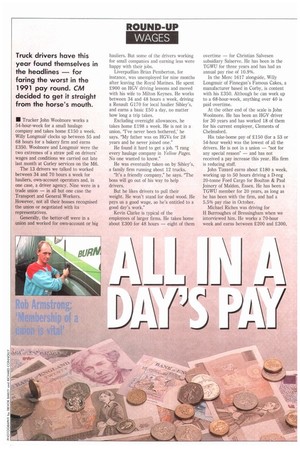ROUND-UP WAGES
Page 36

If you've noticed an error in this article please click here to report it so we can fix it.
Truck drivers have this year found themselves in the headlines — for faring the worst in the 1991 pay round. CM decided to get it straight from the horse's mouth.
• Trucker John Woolmore works a 54-hour-week for a small haulage company and takes home £150 a week. Willy Longmuii clocks up between 55 and 68 hours for a bakery firm and earns £350. Woolmore and Longmuir were the two extremes of a straw poll on drivers' wages and conditions we carried out late last month at Corley services on the M6.
The 13 drivers we talked to worked between 34 and 70 hours a week for hauliers, own-account operators and, in one case, a driver agency. Nine were in a trade union — in all but one case the Transport and General Workers. However, not all their bosses recognised the union or negotiated with its representatives.
Generally, the better-off were in a union and worked for own-account or big hauliers. But some of the drivers working for small companies and earning less were happy with their jobs.
Liverpudlian Brian Pemberton, for instance, was unemployed for nine months after leaving the Royal Marines. He spent £900 on HGV driving lessons and moved with his wife to Milton Keynes. He works between 34 and 48 hours a week, driving a Renault G170 for local haulier Sibley's, and earns a basic £50 a day, no matter how long a trip takes.
Excluding overnight allowances, he takes home £198 a week. He is not in a union. I've never been bothered,' he says. "My father was on HGVs for 28 years and he never joined one."
He found it hard to get a job. "I rang every haulage company in Yellow Pages. No one wanted to know."
He was eventually taken on by Sibley's, a family firm running about 12 trucks.
"It's a friendly company," he says, "The boss will go out of his way to help drivers.
But he likes drivers to pull their weight. He won't stand for dead wood. He pays us a good wage, so he's entitled to a good day's work."
Kevin Clarke is typical of the employees of larger firms. He takes home about £300 for 48 hours — eight of them overtime — for Christian Salvesen subsidiary Salserve. He has been in the TGWU for three years and has had an annual pay rise of 10.9%.
In the Merc 1617 alongside, Willy Longmuir of Finnegan's Famous Cakes, a manufacturer based in Corby, is content with his £350. Although he can work up to a 68-hour-week, anything over 40 is paid overtime.
At the other end of the scale is John Woolmore. He has been an HGV driver for 30 years and has worked 18 of them for his current employer, Clements of Chelmsford.
His take-home pay of £150 (for a 53 or 54-hour week) was the lowest of all the drivers. He is not in a union — "not for any special reason" — and has not received a pay increase this year. His firm is reducing staff.
John Tizzard earns about £180 a week, working up to 50 hours driving a D-reg 20-tonne Ford Cargo for Boulton & Paul Joinery of Maldon, Essex. He has been a TGWU member for 20 years, as long as he has been with the firm, and had a 5.5% pay rise in October.
Michael Riches was driving for H Burroughes of Bressingham when we interviewed him. He works a 70-hour week and earns between £200 and £300,








































































